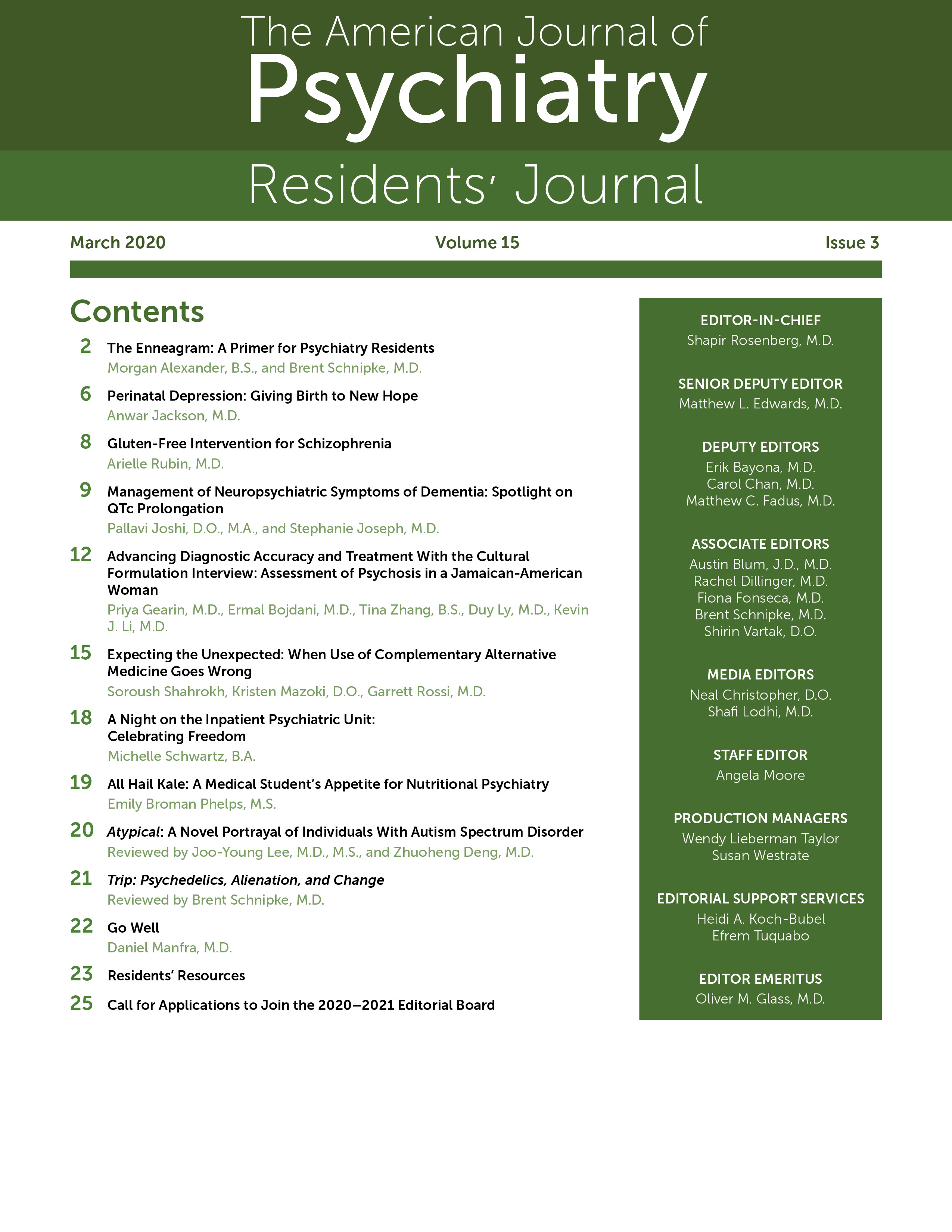Gluten-Free Intervention for Schizophrenia
With renewed research interest in the brain–gut axis in psychiatry, clinicians and researchers have increasingly focused on neuroinflammation and immune system activation in psychiatric disorders (1). Within this domain, research on gluten protein ingestion and the potential development of symptoms of schizophrenia is an area of resurgent and exciting research. Researchers first linked gluten to schizophrenia after World War II. As Nordic populations ended rationing of wheat products, researchers noted a significant correlation between abrupt increases in wheat consumption and first-episode psychosis (1). By 1948, case reports emerged describing comorbidity between childhood celiac disease and schizophrenia (2). This accumulating evidence led to the "cereal theory," which postulated that some individuals have hyperreactive neuronal opioid receptors that uptake excessive amounts of gluten exorphin peptides. This is significant for schizophrenia because exorphins affect dopaminergic signaling in mechanisms not completely understood.
Researchers postulate that excess gluten exorphin uptake could disrupt brain dopaminergic homeostasis and increase the risk of developing schizophrenia in vulnerable individuals (2). In the 1970s, a small randomized controlled trial (RCT) found that patients with schizophrenia who received a gluten-free diet (GFD) intervention in addition to standard-of-care inpatient psychiatric management stabilized and discharged faster than blinded counterparts without a GFD (1). During the past 10 years, research has discovered unique gluten sensitivity biomarkers in a minority of patients with schizophrenia, postulating gluten antibody–mediated neuroinflammation as a factor exacerbating symptoms (3).
The Clinical Antipsychotic Trials for Intervention Effectiveness (CATIE) first assessed these biomarkers and found anti-gluten antibodies, including anti-tTG and anti-gliadin antibodies (AGA), 50 times more likely to be pathologically elevated in subjects with schizophrenia (3). Recently published case reports and small RCTs are utilizing these findings to study GFD interventions in patients with schizophrenia and with known AGA (4). Preliminary findings suggest improvement in positive symptoms, negative symptoms, extrapyramidal symptoms, attention, and gastrointestinal discomfort in patients on a GFD with AGA (5).
At this time, there is insufficient evidence to recommend a standard GFD intervention in schizophrenia. Traditional medication and psychosocial therapies are still the first lines of treatment. Given the high disease burden of schizophrenia and the high rates of medication discontinuation and treatment resistance, a GFD trial may be an interesting potential therapeutic addition in the future. Ongoing research may answer questions regarding utility of this diet in certain patient populations or stages of illness. In particular, patients with comorbid dermatological, neurological, and gastrointestinal conditions may have the greatest chance of benefit from a GFD. As psychiatrists, we should follow this area of research attentively. We should be prepared to discuss with patients frankly what is known regarding gluten elimination nutritional interventions for schizophrenia.
1. : A review of psychiatric disorders associated with celiac disease. Dual Diagn: Open Access 2017; 2(2):1 Google Scholar
2. : The possible pathogenic effect of cereal grains in schizophrenia. Acta Neurol 1976; 31:195–205 Google Scholar
3. : Prevalence of celiac disease and gluten sensitivity in the United States Clinical Antipsychotic Trials of Intervention Effectiveness study population. Schizophr Bull 2011; 37:94–100 Crossref, Google Scholar
4. : Randomized double-blind feasibility study of a gluten-free diet in patients with schizophrenia positive for antigliadin antibodies (AGA IgG): a pilot feasibility study. Schizophr Bull 2018; 44:269–276 Crossref, Google Scholar
5. : A gluten-free diet in people with schizophrenia and anti-tissue transglutaminase or anti-gliadin antibodies. Schizophr Res 2012; 140:262–263 Crossref, Google Scholar



